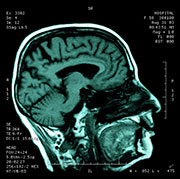- Could Your Grocery Store Meat Be Causing Recurring UTIs?
- Are You Making This Expensive Thermostat Error This Winter?
- Recognizing the Signs of Hypothyroidism
- 10 Strategies to Overcome Insomnia
- Could Artificial Sweeteners Be Aging the Brain Faster?
- Techniques for Soothing Your Nervous System
- Does the Water in Your House Smell Funny? Here’s Why
- Can a Daily Dose of Apple Cider Vinegar Actually Aid Weight Loss?
- 6 Health Beverages That Can Actually Spike Your Blood Sugar
- Treatment Options for Social Anxiety Disorder
Stem Cell Research Offers Clues About Schizophrenia


New research involving stem cells may provide clues about the chemical basis for schizophrenia, scientists report.
Brain cells of people with this chronic and disabling brain disorder give off higher amounts of three neurotransmitters linked to a range of psychiatric disorders, researchers found. Neurotransmitters are chemicals that trigger or block the transmission of electrical signals in the brain.
Although the cause of schizophrenia remains unknown and there is no cure, the study authors suggested their findings shed new light on the chemical basis of the disorder. Ultimately, they believe the study results could help scientists treat patients with schizophrenia more effectively.
“The study provides new insights into neurotransmitter mechanisms in schizophrenia that can lead to new drug targets and [treatments],” study senior author Vivian Hook, a professor with Skaggs School of Pharmacy at the University of California, San Diego, School of Medicine.
“All behavior has a neurochemical basis in the brain. This study shows that it is possible to look at precise chemical changes in neurons of people with schizophrenia,” she said in a university news release.
In conducting the study, published online Sept. 11 in Stem Cell Reports, researchers created working brain cells using stem cell technology. The brain cells were activated to secrete neurotransmitters.
The brain cells taken from people with schizophrenia gave off higher amounts of three neurotransmitters: dopamine, norepinephrine and epinephrine.
The researchers also found that for people with schizophrenia, more brain cells were focused on production of tyrosine hydroxylase — an initial step in the production of dopamine. They noted that both norepinephrine and epinephrine are made from dopamine.
Potentially, the findings could help doctors evaluate the severity of a patient’s disease, identify different types of schizophrenia and determine which treatments would be most effective.
“It is very powerful to be able to see differences in neurons derived from individual patients,” Hook concluded.
The U.S. National Institutes of Health provided partial funding for the study.
More information
The U.S. National Institute of Mental Health has more about schizophrenia.
Source: HealthDay
Copyright © 2026 HealthDay. All rights reserved.










